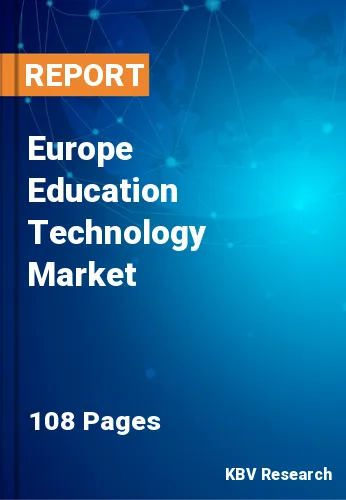The Europe Education Technology Market would witness market growth of 15.3% CAGR during the forecast period (2022-2028).
Grading has become much easier thanks to artificially intelligent tools. Machine learning is used in such apps to analyze and evaluate solutions depending on the assignment's parameters. To use these tools, particularly for concrete tasks such as true/false or fill-in-the-blank examinations, allows teachers to invest less time grading. Educators with more free time have more flexibility in terms of preparation or one time with both difficult and gifted pupils.
Students may now complete their educational activities from the comfort of home, owing to smart classrooms that use remote learning and multimedia tools. Teachers can now call on every student in the room without moving their desk, measure individual student progress, and provide guidance or support without moving their station. It also enables students to work on projects collaboratively from wherever in the classroom. The smart classroom programme improves the teaching-learning procedure by allowing students to utilize all online learning resources. Sophisticated cameras would be mounted in the classrooms to allow for live recording of sessions that students and teachers would be able to access for future purposes.
Germany is the European Union's strongest economy (EU). Germans are well-educated, and international experience is valued as a competitive advantage in the job market and for further education. COVID-19 had an overall negative effect on international enrolment in the United States, according to the Open Doors 2021 report, with a 15% reduction in higher education compared to 2019/2020. In comparison to the previous academic year, the percentage of German students enrolled in American higher education decreased significantly. The influence of the COVID-19 pandemic is responsible for this decline.
The majority of nations integrate digital competence development at all three levels of education. Among other conventional school courses, though, it is handled not only as a separate topic, but also as a transversal core competence. In primary education, digital competence is not specifically mentioned in the national curriculum in eight education systems, whereas this is that was only the situation in secondary education in two systems. The rapid pace of digitalization within the education sector of the region would surge the growth of the regional education technology market over the forecast period.
The Germany market dominated the Europe Education Technology Market by Country in 2021, and would continue to be a dominant market till 2028; thereby, achieving a market value of $19,373.5 Million by 2028. The UK market is poised to grow at a CAGR of 14.3% during (2022 - 2028). Additionally, The France market would display a CAGR of 16.1% during (2022 - 2028).
Based on Deployment, the market is segmented into On-premise and Cloud. Based on Type, the market is segmented into Hardware, Software, and Content. Based on End User, the market is segmented into Business and Consumer. Based on Sector, the market is segmented into K-12, Preschool, Higher Education, and Others. Based on countries, the market is segmented into Germany, UK, France, Russia, Spain, Italy, and Rest of Europe.
Free Valuable Insights: The Global Education Technology Market will Hit $283 Billion by 2028, at a CAGR of 15.5%
The market research report covers the analysis of key stake holders of the market. Key companies profiled in the report include Google LLC, Microsoft Corporation, Instructure, Inc., Coursera, Inc., Chegg, Inc., edX, Inc., BYJU'S, Upgrad Education Private Limited, Udacity, Inc., and Edutech.
By Deployment
By Type
By End User
By Sector
By Country
Our team of dedicated experts can provide you with attractive expansion opportunities for your business.

